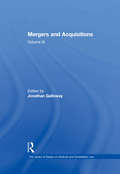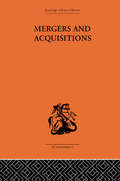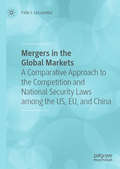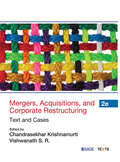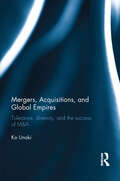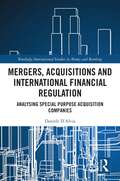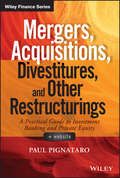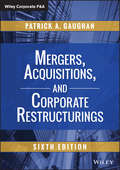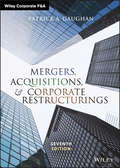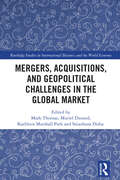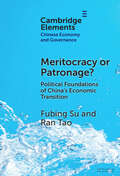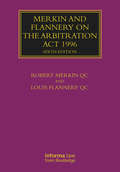- Table View
- List View
Mergers and Acquisitions: Volume III (The Library of Essays on Antitrust and Competition Law)
by Jonathan GallowayMergers and acquisitions occur for many legitimate reasons and should be encouraged as a matter of general policy, yet the resulting increase in the level of market concentration and market strength can lead to concerns that certain ’deals’ may irreparably damage the market structure and create anti-competitive effects. This volume explores the competition concerns arising out of mergers and acquisitions, the reasons for merger control and the fundamental options that face all jurisdictions intent on implementing an effective merger control regime. The volume acts as a guide through the development of merger control law, policy and scholarly thought and includes commentary on each of the key stages of any effective merger control regime. The articles consider the objectives of merger control and the broader political landscape within which mergers take place; the procedural issues in merger control, including jurisdictional matters and due process; the different substantive legal standards incorporated into merger control; the relevant theories of harm and the appropriate treatment of efficiencies; and the use of remedies in merger control. The chosen articles mainly, but not exclusively, focus on the US and EU, and several adopt a cross-disciplinary approach encompassing law, political science and economics.
Mergers and Aquisitions: Planning and Action
by G Richard YoungThoroughly discussing the problems of uniting two independent companies (problems which are commonly underestimated), this book covers a wide range of subjects such as: laws and regulations governing mergers; consideration of financial and material resources; tax views; research and development prospects, as well as the matching and augmenting of skills and equipment of both companies and the adjustments to be made to stock-holders and servicers.The issues of morale, retaining trained personnel, and the rearrangement of employee benefits and pensions are also examined.Check lists, tabulated examples, a hypothetical case history and a comprehensive bibliography made up the extensive appendices.
Mergers in the Global Markets: A Comparative Approach to the Competition and National Security Laws among the US, EU, and China
by Felix I. LessamboInternational mergers and acquisitions play a vital role behind the growth of a company. This book explores the hurdles involved and how to navigate through the review processes set up by national regulatory agencies such as the US Committee on Foreign Investment (CFIUS), the EU Commission, and the Anti-Monopoly Bureau of State Administration of Market Regulation of China (AMB). This book is unique and showcases how to anticipate, develop, and implement successful strategies to support mergers and acquisitions activities, particularly of interest to finance and law students, researchers, and academics.
Mergers, Acquisitions and Corporate Restructuring: Text and Cases
by Chandrasekhar Krishnamurti and Vishwanath S. R.This revised edition of the well-known text provides a comprehensive and well-balanced overview of the entire spectrum of activities in merger transactions, acquisitions, and corporate restructuring process. It comprises of insightful modules on search for acquisitions, value drivers and target valuation, design of consideration, accounting and tax factors, cross border acquisitions, and the restructuring of equity and debt contracts. Intended for students with an interest in the financial, strategic, and business issues surrounding corporate restructuring, this book will take the readers through a rigorous understanding of valuation in a variety of corporate settings. Mergers, Acquisitions, and Corporate Restructuring: Text and Cases incorporates seven brief cases and six full-length teaching cases that instructors can use for classroom discussion and for in-depth understanding of the issues at hand. The book will help the readers answer crucial questions such as: • When does it make sense to acquire or restructure a firm's operations? • How does the structure of the deal affect the value creation potential? • How much value will the acquisition or restructuring create? • What are some of the post-merger integration issues that managers face?
Mergers, Acquisitions and Global Empires: Tolerance, Diversity and the Success of M&A
by Ko UnokiCompanies that have acquired other enterprises through mergers and acquisitions (M&A) have in essence become entities that are akin to the global "empires" of history. In this book, the author weaves a unique narrative that looks at both empires of business created from M&A and global empires from world history in an attempt to answer the question: why do certain empires endure for long periods while others collapse in a short space of time. Empires formed from M&A or conquest have a hierarchical relationship of control and domination by a single authority or centre that can be described as a "parent company" or a "mother country" over another group of people based in a periphery that can be described as a "subsidiary company" or "colony." Given their similarities in development and structure, the author argues from looking at examples of empires in Western and Asian history as well as major M&A cases that long enduring empires created from M&A and global empires have a common cultural trait; their practice of "tolerance" within their organizations/societies. While there are books on the topics of M&A and empires, at present there is no single text that examines the impact of culture on both. This book is intended to fill such a void and provide hints and suggestions to those practitioners of M&A as well as students of business and history who want an accessible, non-technical narrative on what makes empires, whether they are of the nation or of M&A endure and prosper.
Mergers, Acquisitions and International Financial Regulation: Analysing Special Purpose Acquisition Companies (Routledge International Studies in Money and Banking)
by Daniele D'AlviaThis is a much-needed work in the financial literature, and it is the first book ever to analyse the use of Special Purpose Acquisition Companies (SPACs) from a theoretical and practical perspective. By the end of 2020, more than 240 SPACs listed in the U.S. (on NASDAQ or the NYSE), raising a record $83 billion. The SPAC craze has been shaking the U.S. for months, mainly because of its simplicity: a bunch of investors decides to buy shares at a fixed price in a company that initially has no assets. In this way, a SPAC, also known as a "blank check company", is created as an empty shell with lots of money to spend on a corporate shopping spree. Could the trend be here to stay? Are SPACs the new legitimate path to traditional IPO? This book tackles those questions and more. The author provides a thorough analysis of SPACs including their legal framework and how they are used as a risk mitigation tool to structure transactions. The main objectives of the book are focused on finding a working definition for SPACs and theorising on their origins, definition, and evolution; identifying the objectives of financial regulation within the context of the recent financial crisis (2007-2010) and the one that is currently unfolding (Covid-19); and also describing practical examples of SPACs through a comparative study that, for the first time, outlines every major capital market on which SPACs are listed, in order to identify a possible international standard of regulation. The book is relevant to academics as well as policymakers, international financial regulators, corporate finance lawyers as well as to the financial industry tout court.
Mergers, Acquisitions, Divestitures, and Other Restructurings
by Paul PignataroThe authoritative resource for analyzing mergers and acquisitions (M&A) from every anglePaul Pignataro reveals the secrets behind growth through M&A in his new book, Mergers, Acquisitions, Divestitures, and Other Restructurings + Website. Through market shifts and regulatory changes, M&A has served as a solid approach to growth. Creating value through mergers and acquisitions is a highly coveted strategy, and Wall Street has long sought a clear technical understanding of the components of M&A as a key driver of growth. In this book, the author provides that understanding, covering all essential aspects of accounting and modeling for the M&A process.With over a decade of experience aiding billion-dollar restructuring deals, Paul Pignataro is in an excellent position to break down M&A from a finance standpoint. Mergers, Acquisitions, Divestitures, and Other Restructurings covers the financial accounting and modeling behind several M&A structures. Using the merger of Office Depot and Office Max, Mr. Pignataro fully addresses the entire integration, explains EBITDA, and other crucial performance measures. This text is for finance practitioners who want to explore every corner of the M&A process.Learn accounting for asset acquisitions, asset divestitures, and corporate mergersExplore modeling methods including mini-merger modeling and fully consolidated merger modelingRead case studies demonstrating the practical success of theoretical modelsUnderstand EBITDA, cash flow, capital structure, and their impact on M&A success and value creationThis new text from the CEO and founder of the New York School of Finance is key for understanding how restructuring leads to growth and value creation. The importance of M&A shows no signs of slowing, meaning that finance professionals need to be able to accurately analyze the prospects and impacts of restructuring moves. Mergers, Acquisitions, Divestitures, and Other Restructurings + Website is the authoritative resource for doing just that.
Mergers, Acquisitions, and Corporate Restructurings
by Patrick A. GaughanModern restructuring techniques for a global business landscapeMergers, Acquisitions, and Corporate Restructurings, Fifth Edition carefully analyzes the strategies and motives that inspire M&As, the laws and rules that govern the field, as well as the offensive and defensive techniques of hostile acquisitions.Incorporates updated research, graphs, and case studies on the private equity market, ethics, legal frameworks, and corporate governanceExpanded and updated chapters on corporate governance, joint ventures and strategic alliances and valuationExpanded global treatment of the field of M&AShows business managers and financial executives how corporate restructuring can be used successfully in any companyLooks at the most effective offensive and defensive tactics in hostile bidsReviews the impact on shareholder wealth on a variety of takeover actionsPacked with the most up-to-date research, graphs, and case studies, Mergers, Acquisitions, and Corporate Restructurings, Fifth Edition provides a fresh perspective on M&As in today's global business landscape.
Mergers, Acquisitions, and Corporate Restructurings
by Patrick A. GaughanThe essential M&A primer, updated with the latest research and statistics Mergers, Acquisitions, and Corporate Restructurings provides a comprehensive look at the field's growth and development, and places M&As in realistic context amidst changing trends, legislation, and global perspectives. All-inclusive coverage merges expert discussion with extensive graphs, research, and case studies to show how M&As can be used successfully, how each form works, and how they are governed by the laws of major countries. Strategies and motives are carefully analyzed alongside legalities each step of the way, and specific techniques are dissected to provide deep insight into real-world operations. This new seventh edition has been revised to improve clarity and approachability, and features the latest research and data to provide the most accurate assessment of the current M&A landscape. Ancillary materials include PowerPoint slides, a sample syllabus, and a test bank to facilitate training and streamline comprehension. As the global economy slows, merger and acquisition activity is expected to increase. This book provides an M&A primer for business executives and financial managers seeking a deeper understanding of how corporate restructuring can work for their companies. Understand the many forms of M&As, and the laws that govern them Learn the offensive and defensive techniques used during hostile acquisitions Delve into the strategies and motives that inspire M&As Access the latest data, research, and case studies on private equity, ethics, corporate governance, and more From large megadeals to various forms of downsizing, a full range of restructuring practices are currently being used to revitalize and supercharge companies around the world. Mergers, Acquisitions, and Corporate Restructurings is an essential resource for executives needing to quickly get up to date to plan their own company's next moves.
Mergers, Acquisitions, and Geopolitical Challenges in the Global Market (Routledge Studies in International Business and the World Economy)
by Mark Thomas Muriel Durand Kathleen Marshall Park Sniazhana DiducIn an era marked by unprecedented geopolitical uncertainty, Mergers, Acquisitions, and Geopolitical Challenges in the Global Market explores the intricate ways global events shape the landscape of mergers and acquisitions (M&As).From the COVID-19 pandemic to ongoing conflicts in Ukraine and the Middle East, this book offers a timely analysis of how these disruptions affect corporate strategies and economic stability and is essential for understanding the interplay between geopolitics and business operations. This comprehensive guide goes beyond traditional M&A considerations, incorporating geopolitical risks, regulatory changes, and technological advancements into the strategic equation. Readers will gain insights into why companies sometimes increase investments in unstable regions, how to capitalize on unique market opportunities amidst turmoil, and the complexities of divestment in high-risk environments. The book also provides actionable advice for firms to navigate these challenges effectively and highlights new research avenues for scholars.This edited collection is an indispensable resource for academic researchers and will also be of interest to corporate executives, M&A professionals, and policymakers. It offers valuable perspectives for those involved in strategic decision-making and provides advanced students with a nuanced understanding of the evolving M&A landscape in a volatile geopolitical context.
Merging American Airlines and US Airways
by David A. Garvin Carin-Isabel Knoop David G. FubiniIn February 2013, US Airways announced that it would merge with American Airlines to create the world's largest airline. Doug Parker, the CEO of US Airways, would become CEO of the new American Airlines Group (AAL).The case describes a number of critical decisions Parker made and actions that he took in the course of the acquisition integration process. All focused on how best to combine the two airlines' core systems and operating processes as well as the appropriate scope and speed of strategic changes. Now, Parker must decide on the composition of AAL's senior executive team. Should Parker select a team dominated by US Airways executives with whom he has successfully worked for decades? Or should he establish a new team with roughly equal representation from both airlines? Parker's choice will send important signals to employees about the extent to which the transaction will be viewed as a merger of equals or as a takeover by US Airways.
Merging American Airlines and US Airways (A)
by David A. Garvin Carin-Isabel Knoop David G. FubiniIn February 2013, US Airways announced that it would merge with American Airlines to create the world's largest airline. Doug Parker, the CEO of US Airways, would become CEO of the new American Airlines Group (AAL).The case describes a number of critical decisions Parker made and actions that he took in the course of the acquisition integration process. All focused on how best to combine the two airlines' core systems and operating processes as well as the appropriate scope and speed of strategic changes. Now, Parker must decide on the composition of AAL's senior executive team. Should Parker select a team dominated by US Airways executives with whom he has successfully worked for decades? Or should he establish a new team with roughly equal representation from both airlines? Parker's choice will send important signals to employees about the extent to which the transaction will be viewed as a merger of equals or as a takeover by US Airways.
Merging American Airlines and US Airways (B)
by David A. Garvin Carin-Isabel Knoop David G. FubiniExhibit to Merging American Airlines and US Airways (A) case. In February 2013, US Airways announced that it would merge with American Airlines to create the world’s largest airline. Doug Parker, the CEO of US Airways, would become CEO of the new American Airlines Group (AAL). The case describes a number of critical decisions Parker made and actions that he took in the course of the acquisition integration process. All focused on how best to combine the two airlines’ core systems and operating processes as well as the appropriate scope and speed of strategic changes. Now, Parker must decide on the composition of AAL’s senior executive team. Should Parker select a team dominated by US Airways executives with whom he has successfully worked for decades? Or should he establish a new team with roughly equal representation from both airlines? Parker’s choice will send important signals to employees about the extent to which the transaction will be viewed as a merger of equals or as a takeover by US Airways.
Merging Interests: When Domestic Firms Shape FDI Policy (Business and Public Policy)
by Sarah Bauerle DanzmanWhy do governments open their economies to multinational enterprises (MNEs)? Some argue democratic forces promote this openness, but many citizen groups view multinational business with suspicion. Using quantitative and qualitative analysis, Bauerle Danzman demonstrates how large domestic firms push to liberalize foreign direct investment (FDI) policies to ameliorate financing constraints, often to the detriment of smaller competitors. MNE entry comes with substantial risks, such as higher labour costs and increased productivity pressures, so well-connected domestic firms will prefer to limit access to local markets when the costs of debt financing are relatively low. However, when local environments make debt financing increasingly expensive, firms will be more willing to dismantle restrictive investment policies so that they may overcome liquidity constraints with equity financing from abroad. Bauerle Danzman includes comparative analysis of Malaysia and Indonesia from 1965–2016 to illustrate how governments undertake investment policy reform, and to indicate the interest groups that influence the outcomes of these regulatory changes.
Meritocracy or Patronage?: Political Foundations of China's Economic Transition (Elements in Chinese Economy and Governance)
by Fubing Su Ran TaoThis study interrogates the theoretical and empirical validities of two dominant theories about Chinese state in the post-Mao period. The authors argue that the meritocratic view has under-theorized the innate contradiction between officials' personal competence and political loyalty. In order to survive political struggles, political leaders need to rely on patronage networks to recruit followers and solidify trust, often at the expense of official competence. The popular view also misrepresents China's cadre assessment system in several important ways. The authors supplement this theoretical and anecdotal evidence with a systematic study of provincial level officials between 1978 and 2020. Contrary to the meritocratic view, leaders' economic performance does not increase their promotion chances. Work ties with central leaders, on the other hand, have provided provincial officials with advantage in promotion. This study contributes to general theories of autocratic state and inform the debate about autocratic growth in the political economy literature.
Merkin and Flannery on the Arbitration Act 1996 (Lloyd's Arbitration Law Library)
by Robert Merkin Louis FlanneryThis book is an essential resource for anybody involved in arbitration. It is an updated section-by-section commentary on the Arbitration Act 1996, split into a separate set of notes for each section, and subdivided into the relevant issues within that section. It contains elements of international comparative law, citing authorities from many other common law and civil law jurisdictions. Beyond the development of law since the last edition, this sixth edition contains new practical features to aid the reader. Each section now has a new contents table, with each separate topic set out clearly and in a logical order, which acts as reminder for the reader. Further, each separate topic now has a specific individual reference, and the topics are grouped in a more systematic and logical way within each section, to improve readability. The book is primarily aimed at practitioners of arbitration both in the UK and abroad, including solicitors, barristers, arbitrators and judges who are involved in the practice of arbitration (whether domestic or international). It is also aimed at UK and international students of international arbitration, especially in relation to the sections with comparative legal analysis and comprehensive discussions on the interaction between the Arbitration Act 1996 and institutional arbitration rules.
Merloni Elettrodomestici SpA: The Transit Point Experiment
by Maura Kelly Janice H. HammondMerloni Elettrodomestici is a leading Italian manufacturer of domestic appliances. In 1986, an exposition for Merloni customers is scheduled at its Milano regional warehouse. During the two-month period preceding the event, when the warehouse must be free of inventory, the company conducts a "transit point" experiment. Each day, a truckload of products from the company's central warehouse is sent to Milano, where it is immediately transferred to small trucks for local delivery. At the conclusion of the experiment, the company is considering the replacement of its 17 regional warehouses with transit points. Students are asked to evaluate this proposal and recommend a configuration for Merloni's distribution network. Issues to be considered in the analysis of the case include the impact of different network configurations on customer service and on inventory, labor, operating, and transport costs.
Merrill Lynch: Integrated Choice
by V. Kasturi Rangan Marie BellMerrill Lynch, a full-service brokerage firm with $1.5 trillion in client assets, is under attack from both discount and electronic brokerage firms. It responds with Integrated Choice, a suite of products designed to capture clients from the do-it-yourself investor who doesn't want to use a broker to clients who want to rely completely on a broker. The strategy is high risk and requires a sea change from the company.
Merrill Lynch: Supernova
by Rogelio Oliva Gabriel Bitran Roger HallowellSupernova is the name given to a new way to manage client relationships that originated in the Merrill Lynch Indianapolis offices. During a trial period, Supernova generated very good results among financial advisers and their customers, but challenged the traditional ways in which financial advisers were rewarded and the nature of the relationship with their clients. The case protagonist needs to decide whether to recommend a national rollout for Supernova.
Merrimack Pharmaceuticals, Inc. (A)
by Amy C. Edmondson Bethany S. Gerstein Melissa A. ValentineIn 2006, Merrimack Pharmaceuticals was a fast-growing biotechnology company. Its leadership team was divided over whether to keep R&D organized in functional departments or transition to interdisciplinary teams. As a small company, Merrimack's R&D organization had established a culture of collaboration across scientific disciplines that some worried would diminish with larger functional departments. Others were concerned that an interdisciplinary team-based design would be inefficient and difficult to manage. This case describes the two proposed organizational designs and presents the arguments within Merrimack's leadership team for and against each. It highlights the tradeoffs associated with each design as they relate to accountability, efficiency, innovation, product orientation, and people management at every stage in the R&D process. Students will explore the relationships between task complexity, collaboration, and organizational design in R&D.
Merrimack Pharmaceuticals, Inc. (B)
by Amy C. Edmondson Bethany S. Gerstein Melissa A. ValentineIn 2006, the leadership team at Merrimack Pharmaceuticals, Inc. had to decide whether to keep its R&D organization in functional departments or restructure it into interdisciplinary teams. This case follows the outcomes of this decision from 2006 to mid-2014, and considers their impact on productivity, accountability, communication, and skill development from the perspectives of employees in Merrimack's R&D organization.
Merrimack Tractors and Mowers, Inc.: LIFO or FIFO?
by William J. Bruns Jr. Susan S. Harmeling Sharon BrunsAt Merrimack Tractors and Mowers in 2008, product manufacturing costs are increasing faster than competitors' costs, and as a result earnings are likely to fall below those reported in 2007. The company president and the company controller have discussed this problem, and the controller has mentioned that if the company changed from LIFO to FIFO it might be possible to maintain earnings growth in 2008. He prepares a memo to the president explaining how inventory flow assumptions work and provides pro-forma income statements that show that, for one product (reel mower units), adopting FIFO would allow Merrimack to report higher income in 2008 than it did in 2007, but higher income taxes would have to be paid.
Merrythought Teddy Bears (British Collectable Toys Series)
by Kathy MartinA deep dive into the history of the much-loved plush bear brand from one of the world&’s foremost teddy bear experts. Merrythought was one of Britain&’s longest running British-made teddy bear firms with a dedicated international following for their quality, highly collectable bears whose life-size models used to dominate stores such as Harrods and Hamleys. This book—with its quality color illustrations and use of original sales material—will appeal to teddy bear collectors as well as dedicated Merrythought fans and is full of tips on collecting the popular toys. Written by leading teddy bear expert, Kathy Martin, editor of Teddy Bear Scene and a regular on programs such as QVC as well as a consultant to firms producing collectable bears, this is a must for collectors, dealers, and those who loved their own Merrythought teddy bears when young. After a short-term closure, Merrythought was revived and will delight future generations. Its closure made headlines news, showing the enduring popularity of the quality bears. &“This must-read book will appeal to Merrythought and teddy bear collectors and dealers, those who loved their childhood teddies and indeed anyone interested in the history of the great British toy company.&” —Collectors Club of Great Britain
Merton Truck Co.
by Anirudh DhebarIntroduces some of the key concepts in linear programming--problem formulation, relevant costs, shadow prices, and reduced costs. The setting, while artificial, is quite typical: a company manufactures two models of trucks in four manufacturing departments; it must determine the "optimal" production mix given information on selling price, production costs, and manufacturing capacity requirements.
